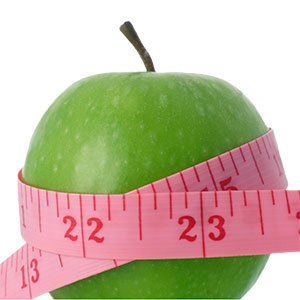- Don’t just track your scale weight
- Pay attention to calories and macronutrients
- Focus on the “easy wins” initially
 I want you to imagine it is the end of March.
I want you to imagine it is the end of March.
In January, you committed to take better care of yourself. You dusted off your gym membership and spent the past three months hitting the weights every morning. But you have just quit, much like two-thirds of the other January returnees. The frustration at seeing a lack of results and the creep of work responsibility and family commitments has eroded your resolve—I see this happen in my work as a nutrition coach.
There are two main reasons this happens, which I want to help you avoid.
Get the measure of it
The first critical mistake people make when trying to shed fat is that they try to gauge their progress based on scale weight. The problem is that this will only tell you about weight change, not any fat or muscle mass changes.
A pattern many people find themselves in is that at the same time they (re)start going to the gym, they make an effort to clean up and improve their diets. People reduce their carbohydrate intake, which often causes 2–3 kg of weight loss in the first couple of weeks, which they think is fat but is just the water that attaches itself to carbs when stored as fuel. At the same time, the muscle from your youth is reactivated, muscle is re-grown and progress appears to slow dramatically because you’re only gauging it based on scale weight.
My advice is simple: track both your scale weight and take stomach measurements. Your weight will fluctuate daily due to water and gut content changes, so weigh yourself each morning upon waking and average it at the end of the week, then compare progress week to week. Take stomach measurements once a week, but do it at the navel, a couple of inches above and also below—this is because fat comes off from the top down, generally speaking.
Get the right balance
The second critical mistake people make is that they fail to make enough consistent effort with their diet, or they focus on the wrong places. Confusion is understandable because the fitness industry is full of nonsense—people want shortcuts, and the juiciest profit margins come from selling them.
But the reality is that energy (calorie) balance is what determines whether we gain or lose weight, and the macronutrients (protein, fat and carbohydrates) that make up that energy balance largely decide whether that is muscle or fat mass.
You don’t often hear this advice being given because there is no profit in telling people this. So, just remember, if what you hear does not affect your energy balance and the component macronutrients, then it is not going to be effective.
Easy wins
Now, the appropriate advice to achieve these things depends on the person. I work with very experienced gym trainees who need to take their nutrition to a higher level of detail to see changes than you probably do, because they have already taken care of the “easy wins”.
If your primary goal is fat loss, here are those easy wins:
- Eat more slowly—it takes your brain a while to register that you are full
- For the same reason, eat salads first and drink water with your meals
- Cut out the obvious bad parts in your diet—you know what they are
- If you order too much food or feel full, leave the food on your plate—getting fat benefits no one
- Moderate your alcohol intake—it contains energy that, ideally, needs to be burned off first before fat
- Eat more protein, as it will help you retain and build muscle, and is the most satiating of the macronutrients—an additional chicken breast or a scoop of protein powder, twice a day, will do
- Sleep long enough that you don’t wake up shattered—a lack of sleep will affect recovery from workouts, altering how well you can retain muscle, and it will cause more hunger issues
- For the same reasons, do your best to manage stress. Gratitude practice at the start and end of each day can help start a great perspective shift. I use “The 5-Minute Journal” app for this.
Remember, we are the product of our habits, not occasions. If you mess up, give yourself a pass.
And if you have any feelings of guilt for taking time to work on your health, cut it out. You will perform better at work, be there for your family and it is one of the most selfless things you can do.
Good luck this new year.






